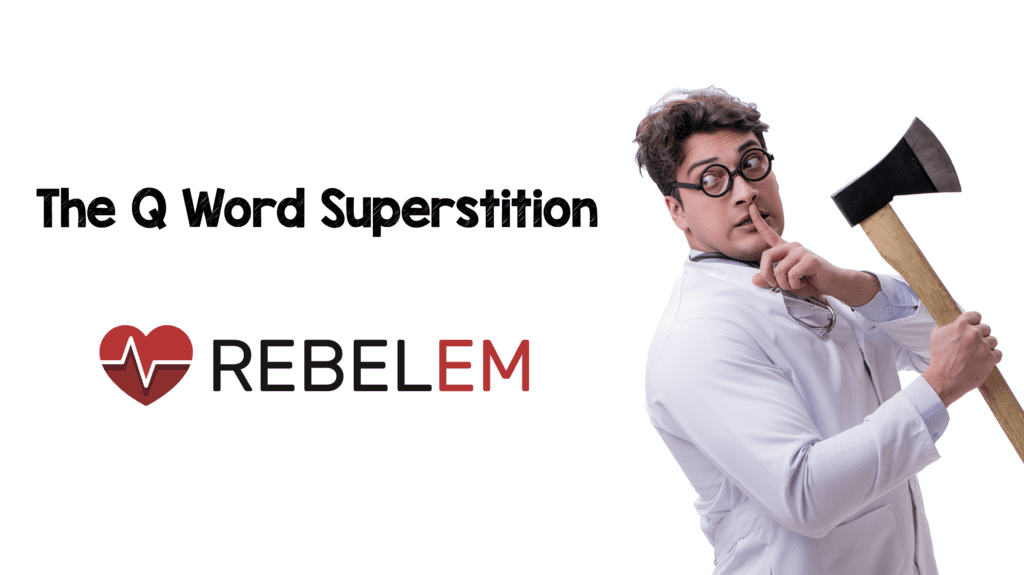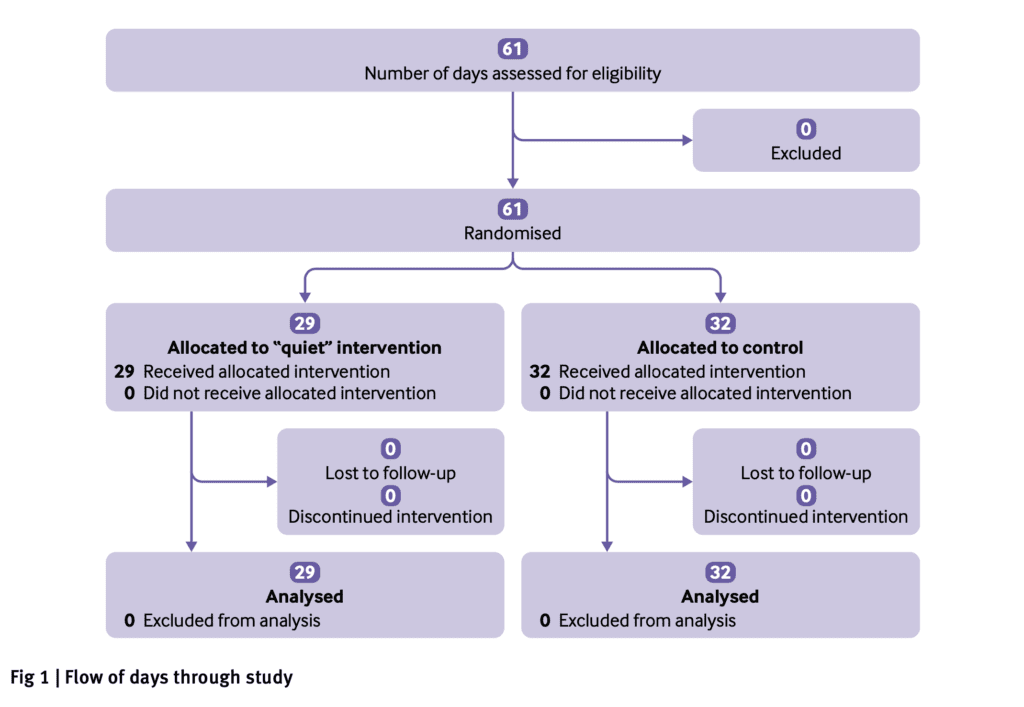

From Research to Practice Ep6.0: The Q Word Superstition
[embedyt] https://www.youtube.com/watch?v=3xm_DnM5jho[/embedyt]
Also Be Sure to Checkout our YouTube Channel

What They Did:
- Determining the validity of the superstition that saying the word “quiet” in a clinical setting increases workload.
- Single center, prospective randomized controlled non-inferiority study
- Took place in the microbiology department of a teaching hospital in the UK
- 29 days randomly assigned in which staff were to say: “Today will be a quiet day” (intervention group) vs 32 days randomly assigned in which staff were to refrain from saying the word “quiet” (control group)

Outcomes:
- Primary: Mean overall workload: A composite of number of clinically related telephone calls, clinically significant results, or validated results processed by the on duty medical microbiology team during a 24 hour period referred to collectively as “clinical episodes” (A difference of 30 clinical episodes was considered the margin of non-inferiority)
- Secondary: Individual components of the primary outcome
Inclusion:
- Healthcare providers
Exclusion:
- N/A
Results:
- Mean Clinical Episodes:
- Not Saying Quiet: 139.0
- Saying Quiet: 144.9
- Difference 5.9 (95% CI -12.9 to 24.7)
- No evidence of difference in workload was found between interventions with any of the four individual components of the primary outcome
- Mean Clinical Episodes on Special Days:
- 3 Full Moon Days or Summer Solstice: 150.7
- Days Without a Full Moon or Summer Solstice: 141.4
- Mean Difference -9.3 (95% CI -53.7 to 35.1)
Strengths:
- Sample size calculations were based on data taken in the winter and the study took place at a traditionally quieter period (May to June)
- Analysis blinded to treatment allocation
- Clinical episodes were witnessed by other team members to ensure accuracy
- Minimized confounding by not disseminating the intervention to colleagues who worked in other departments
- Consecutive days were used, and all information was collected over the full 24hours of the day
- The margin of non-inferiority was prespecified before completion of the protocol and study start
- Analyses were repeated after adjustment for day of the week and bed occupancy as potentially important predictors of workload
- Also performed a post hoc analysis to evaluate whether workload increased on days with a full moon, solstices, or equinoxes, or a Friday the 13th day of the month
Limitations:
- Study took place in a single center, microbiology laboratory which may not extrapolate to an ED setting
- Could not control for the use of the word quiet within the other hospital departments
- Microbiology ward rounds were not included in the data collection
- Did not control for other confounding factors such as seasonal variation, number of microbiological samples received, or presence of black cats, or broken mirrors
- The pre-specified margin of inferiority was determined based on clinical judgment of the authors and colleagues and not from a formal consensus
- There was an imbalance in treatment allocation between weekdays and weekends
Discussion:
- The tone, enthusiasm, and audibility with which the “q word” was uttered was at the discretion of the duty member
- The study included 41 weekdays, two days with a full moon and one day of the summer solstice, and no Friday’s on the 13th day of the month
- Directly from the paper: “areas for further research include whether horse shoes placed outside patient isolation rooms can prevent the transmission of resistant organisms, whether a rabbit’s foot in theatre can reduce surgical site infections, a and whether being touched by a royal can cure tuberculosis.”
Author Conclusion: “The study findings refute the long-held superstition that utterance of the word “quiet” impacts on clinical workload, and therefore it should not be avoided. In the era of considerable staff shortages and increased work-related stress, doctors should look to other methods to increase resilience and protect their wellbeing and mental health.”
Clinical Take Home Point: Use of the “Q word” did not impact clinical workload in this single center study, should not be avoided, and maybe even encouraged, as the sentiment in wishing a colleague a quiet shift is a good one.
References:
- Brookfield CR et al. Q Fever – The Superstition of Avoiding the Word “Quiet” as a Coping Mechanism: Randomised Controlled Non-Inferiority Trial. BMJ 2019. PMID: 31852676
For More on This Topic Checkout:
- First10EM: Saying Quiet has no Effect in Medicine (Obviously)
- JournalFeed: Gosh, It’s Quiet – Does Saying the Q-Word Bring Disaster?
Post Peer Reviewed By: Anand Swaminathan, MD (Twitter: @EMSwami)
The post The Q Word Superstition appeared first on REBEL EM - Emergency Medicine Blog.
